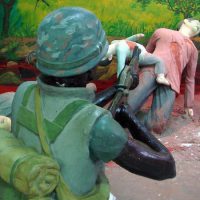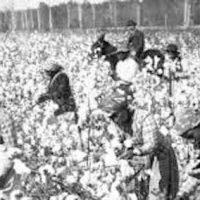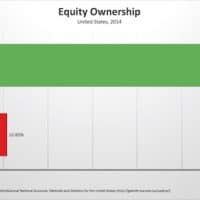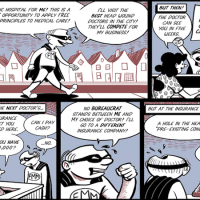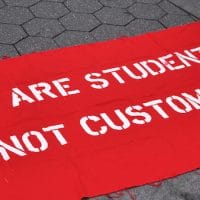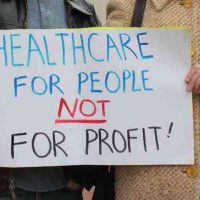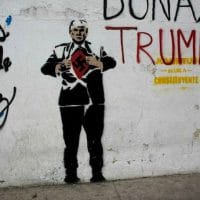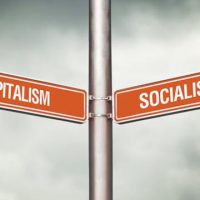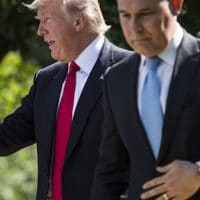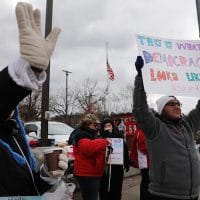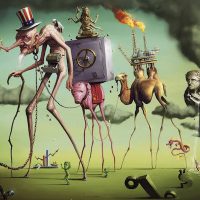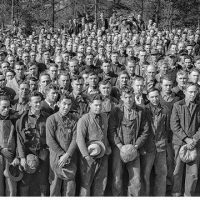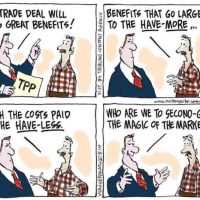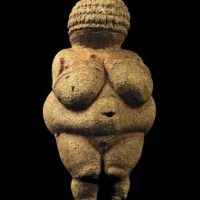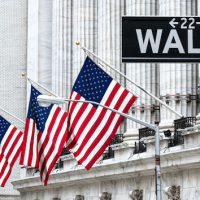-
The new CIA director nominee and the massacre at My Lai
Protecting those who commit heinous crimes in the name of the U.S. government provides a dangerous precedent and could lead to the conclusion by many in the military and CIA that they can “get away with murder,” Ann Wright observes.
-
Today’s capitalism was born in slavery
By 1830, one million Americans, most of them enslaved, grew cotton. Raw cotton was the most important export of the United States, at the center of America’s financial flows and emerging modern business practices, and at the core of its first modern manufacturing industry.
-
Buyback this!
I have been arguing, since 2016, that one of the likely outcomes of the kind of corporate tax cuts Donald Trump and his fellow Republicans have supported—and, as we saw, eventually rammed through—would be an increase in inequality.
-
Utopia and healthcare (part 2)
The dystopia of the American healthcare system certainly invites a utopian response—a ruthless criticism as well as a vision of an alternative.
-
The market can’t solve a massacre
The massacre at Stoneman Douglas High School in Parkland, Florida, one month ago today, left seventeen children and school staff dead. It was the third highest-casualty mass shooting at an educational institution in American history (after Virginia Tech—32 dead—and Sandy Hook—27) and the ninth highest-casualty single-shooter mass shooting in modern American history.
-
Washington’s century-long war on Russia
The United States has launched a three-pronged offensive on Russia. First, it’s attacking Russia’s economy via sanctions and oil-price manipulation. Second, it’s increasing the threats to Russia’s national security by arming and training militant proxies in Syria and Ukraine, and by encircling Russia with NATO forces and missile systems.
-
New CIA director Gina Haspel oversaw torture at a black site then lost evidence of it
As “chief of base” of a CIA Black Site in Thailand, Haspel oversaw the torture and waterboarding of Abu Zubaydah, who still hasn’t been charged with a crime.
-
2008 financial collapse all over again…? We need to understand the student loan speculation bubble
For those who may have missed it, a major economic indicator emerged regarding student loan debt last week. Excessive debt, like student loans, has become one of the biggest barriers to current economic growth in the United States. On Thursday, March 1, 2018, the Chairman of the Federal Reserve, Jerome Powell, appeared before U.S. Congressional representatives.
-
Utopia and healthcare (part 1)
I’ve written quite a bit about the U.S. healthcare dystopia over the years—including a seven-part series back in 2016.* But I haven’t yet addressed the utopian dimensions of healthcare reform.
-
The U.S. can’t revive the Monroe Doctrine or expel China from Latin America, but it can inflict pain on the region
In this MPN exclusive, we speak to Monthly Review editor John Bellamy Foster and Latin America studies scholar Harry L. Simón Salazar about the U.S. fight to maintain hegemony in Latin America, the rise of the right wing, and the danger of “regime change” in Venezuela.
-
What do we mean by socialism?
What the hell is socialism, anyway? Over the last decade, it has been one of the most frequently looked up words in the Merriam-Webster dictionary. And it’s easy to see why so many people feel the need for clarification.
-
Federal court denies Trump’s last-ditch attempt to derail the youth climate lawsuit
A federal court has denied the Trump administration’s last-ditch effort to prevent a landmark climate lawsuit from going to trial. It called the motion “entirely premature” and argued that the administration had failed to reach the “high bar” required for dismissal.
-
The lesson from West Virginia teachers? If you want to win, go on strike
For many years now, observers have been ringing the death knell for the U.S. labor movement. West Virginia teachers haven’t just pumped life back into that movement—they’ve reaffirmed the fundamental principle that the key to building power and winning is for workers to withhold their labor.
-
The world market, ‘North-South’ relations, and neoliberalism
This article argues that Marx, too, knew more about the future than his present. Indeed, far from being merely a theorist of mid- to late-19th century capitalism, he elaborated the basic mechanisms, tendencies, counter-tendencies, contradictions, and social antagonisms that still shape capital accumulation and bourgeois societalization at the start of the 21st century.
-
U.S. workers and their decades of lost earnings
It happened gradually, but thanks to the U.S. media, economic news has largely been reduced to stock market reporting. Want to know how the economy is doing? Check the S&P 500 Index. Want to know whether the latest Trump proposal is good or bad? Check the S&P 500 Index.
-
Race traitors wanted: apply within
The term “white working class” captured much of the media analysis which sought to explain Trump’s meteoric rise and subsequent victory to the highest office in the United States. The obsession with polling and voting trends based in demographics is certainly nothing new.
-
The media’s fake news about Latin America
TIM YOUNG demonstrates how Western coverage of South America is heavily biased against the continent’s progressive leaders, movements and governments.
-
Utopia and trade
Donald Trump’s decision to impose import tariffs—on solar panels and washing machines now, and perhaps on steel and aluminum down the line—has once again opened up the war concerning international trade.
-
Too hot to handle: Facebook mistakes Willendorf Virgin for porn
“An archaeological object, especially iconic, should not be banned from Facebook,” the Museum of Natural History in Vienna said.
-
Bubbles, stocks and crashes
WHAT is happening in the U.S. economy provides an object lesson on the functioning of neo-liberal capitalism. Pre-first world war capitalism which had witnessed the long Victorian and Edwardian boom had relied on the colonial arrangement for the system’s dynamics.

